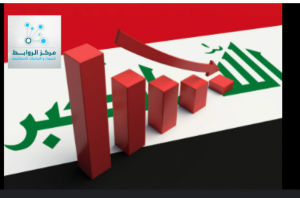BY: Shatha Kalel
Introduction
Over two decades after the 2003 U.S.-led invasion, Iraq continues to face a series of interconnected structural challenges that hinder its economic and social development. These include widespread financial and administrative corruption, chronic mismanagement, high unemployment, and alarming poverty rates. Despite possessing abundant natural resources, particularly oil, Iraq has struggled to transform this wealth into sustainable growth and social prosperity.
The following analysis examines these crises through a comprehensive economic lens, shedding light on their root causes and interconnectedness. It also presents targeted policy recommendations for addressing Iraq’s socio-economic vulnerabilities and fostering long-term stability.
I. Financial and Administrative Corruption: A Systemic Threat
Corruption in Iraq is not merely a peripheral issue—it is a systemic crisis deeply embedded in public administration and economic policy. According to estimates, hundreds of billions of dollars have been lost to corruption over the past two decades, placing Iraq consistently among the most corrupt nations globally, according to Transparency International’s Corruption Perceptions Index.
This rampant corruption has depleted the state treasury and crippled the government’s ability to finance public goods and services. Key sectors—including healthcare, education, infrastructure, and industrial production—have deteriorated due to embezzlement, inflated contracts, and ghost employees. Corruption networks, often linked to political factions and militias, exert significant influence over state institutions, undermining regulatory oversight and the rule of law.
II. Mismanagement and the Fragility of the Oil Rentier Economy
Iraq’s economy remains overwhelmingly dependent on oil, which accounts for over 95% of government revenue. This “rentier state” model exposes Iraq to volatile global oil markets, leading to alternating periods of boom and bust. For example, the 2020 collapse in oil prices resulted in an 11% contraction in GDP, while a rebound in prices in 2022 temporarily boosted growth to 9.3%.
Such volatility hinders medium- and long-term economic planning. The absence of economic diversification leaves Iraq vulnerable to external shocks, exacerbates fiscal imbalances, and limits job creation. Successive governments have failed to develop productive sectors such as agriculture, manufacturing, and technology, thereby deepening the country’s structural dependence on oil.
Furthermore, the management of Iraq’s oil revenues is complicated by international arrangements. Under U.S. Executive Order 13303, Iraqi oil funds are held in the “Iraq-2” account at the U.S. Federal Reserve, allegedly to protect assets from international claims. While this framework offers a degree of legal protection, many Iraqis perceive it as a restriction on national sovereignty. Recent moves to replace the Central Bank’s currency auction with direct international transfers may signify a step toward financial autonomy.
III. Unemployment and Poverty: A Social Time Bomb
The social repercussions of corruption and mismanagement are dire. Iraq’s unemployment rate reached 16.5% by early 2024, while the poverty rate stands at approximately 22%, affecting more than 10 million Iraqis. This economic insecurity is compounded by years of war and displacement, which have created approximately 6 million orphans and 2 million widows.
An estimated 4 million Iraqis live in informal settlements or slum areas, lacking access to clean water, healthcare, education, and other basic services. These conditions not only erode human capital but also fuel resentment, instability, and migration.
Public sector employment remains the largest source of jobs, yet it is bloated, inefficient, and unsustainable. The private sector is underdeveloped, constrained by poor infrastructure, corruption, and lack of access to finance. Young Iraqis entering the labor market face limited prospects, which contributes to social unrest and brain drain.
IV. Policy Recommendations: Toward a Resilient and Inclusive Economy
To address these structural challenges, Iraq must adopt a comprehensive national reform agenda that targets both economic diversification and institutional rebuilding.
1. Anti-Corruption Framework
Establish an independent anti-corruption commission with prosecutorial powers.
Digitize government services and public procurement to increase transparency.
Enforce asset declarations and auditing for public officials.
2. Economic Diversification
Invest in agriculture and agribusiness to reduce food imports and create rural jobs.
Promote small and medium enterprises (SMEs) through targeted credit programs.
Develop strategic industries, including renewable energy, construction, and information technology.
3. Labor Market Reform
Modernize vocational education and training to align with market needs.
Facilitate public-private partnerships to absorb youth into the workforce.
Introduce labor-intensive public works programs in infrastructure and housing.
4. Social Safety Nets
Expand conditional cash transfers targeting vulnerable households.
Provide housing subsidies and basic services in marginalized areas.
Prioritize mental health and social reintegration programs for orphans, widows, and IDPs.
5. Fiscal and Monetary Reforms
Revise the budget structure to prioritize capital investment over operational spending.
Strengthen the independence and capacity of the Central Bank of Iraq.
Renegotiate the legal framework for managing oil revenues to restore financial sovereignty.
Conclusion
Iraq stands at a critical juncture. While the challenges of corruption, unemployment, poverty, and mismanagement are daunting, they are not insurmountable. With strong political will, institutional reforms, and an inclusive economic vision, Iraq can chart a new course toward prosperity and stability.
The road to recovery requires more than just financial resources—it demands courageous leadership, civic engagement, and an unwavering commitment to justice and equity. Only then can Iraq reclaim its rightful place as a stable, prosperous, and sovereign nation.
Economic Unit/North America Office
Al Rawabet Center for Research and Strategic Studies

